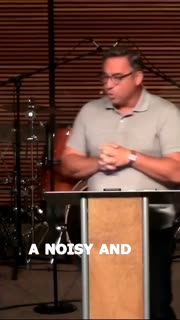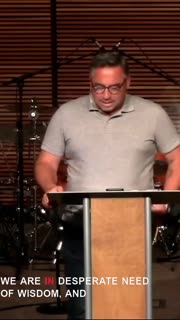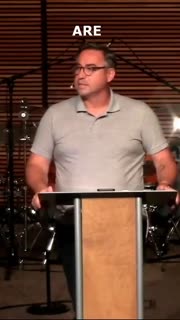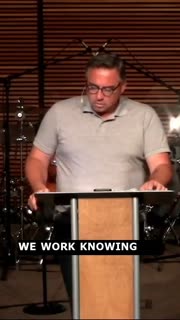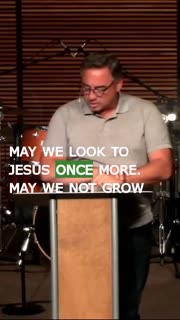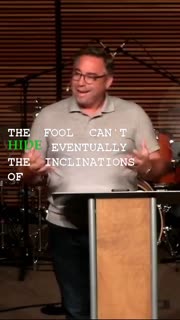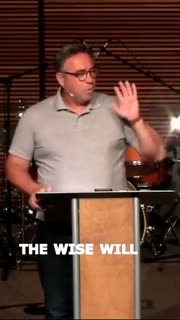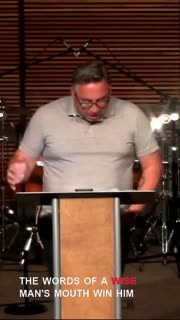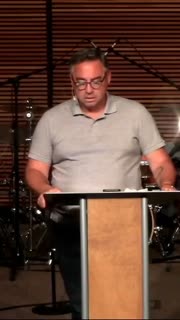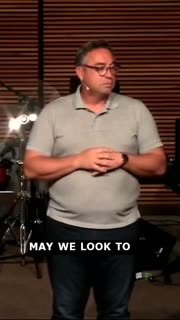Good morning. Good morning. Good morning.
We're continuing in our series here in Ecclesiastes in chapter 10, and we're closing in toward the end, but we start off. I actually want to start with where we kind of left off last week, and so there's a couple verses there at the end of chapter 9, and it says what I say. It says, "The words of the wise, heard in quiet, are better than the shouting of a ruler among fools. Wisdom is better than weapons of war, but one sinner destroys much good."
Boy, we live in a noisy and crowded and confusing world filled with a lot of shouting of opinions and punditry and so-called expert views all the time. There's a lot of misinformation because of that. With the rise of electronic media, social media, we all have the news and ways to communicate and self-publish all within our pockets on our phones. And traditional media trying to keep up with instant kind of misinformation and information. Mark Twain once said that a lie can travel halfway around the world while truth is still putting its shoes on. And I think that seems to be true, doesn't it?
We are in desperate need of wisdom, and we are in desperate need of leaders that carry wisdom and wise leadership. And so this morning, we're going to look at some of these ideas of wisdom and leadership. It's amazing how the wrong leadership or a lack of wisdom among decision makers is so crucial to us. We think of famous examples worldwide that we would know of. Titanic. They were warned of icebergs being in their path and didn't heed the advice, didn't look at the warnings carefully enough, and 1,500 people lost their lives.
The 2008 financial crisis. There were warnings of danger of a housing bubble that was going to burst. And of course, not enough attention was given to that. And it did, and led to global economic downturn. We think of man-made disasters like Chernobyl or even Fukushima. Both of those nuclear plants were warned of safety flaws in their reactors and were not addressed in time. Pearl Harbor. Intelligence warnings. Communication intercepts were not given adequate attention. And we know the loss of life that led to that.
And so we see here this kind of verse 17 into chapter 10 continues on from this motif of leadership and kings in the previous section, where the wise person and their wisdom was forgotten and despised. And we move into now chapter 10. And chapter 10 gives us this kind of collection of proverbial wisdom again. It's a little bit tricky to actually... Proverbs is like this, right? His mind kind of seems a little bit scattered. He'll give an example here, an example here, wisdom here, folly here.
But it seems like a lot of this is set in the context of kind of leadership. He mentions kings and rulers and leaders throughout. And so let's take a look at this proverbial wisdom in the context of kind of leadership under the sun. And again, we'll see this phrase, this refrain that he uses over and over again, "under the sun," ring out. And so a reminder that the wisdom that he is looking at, the wisdom that he will see has limits to it. And even at times can be thwarted is a wisdom that is under the sun. That is a wisdom that is human wisdom. It's a wisdom that is without reference to God, without the fear of the Lord as he refers to it throughout the book that we've seen so far.
And so let's work our way. We're just going to work our way through the chapter and kind of see what we can kind of learn and glean from it. We're just going to work our way through the chapter and kind of see what we can kind of learn and glean from this to help us. Because all of us are leaders at some level. And all of us are also followers at some level. And so maybe you lead at work. Maybe you have a position where you have people underneath you at work. Maybe you're a parent and you're leading kids and your family. At worst case scenario, you are to lead yourself.
So maybe you're looking around going, "I don't know if anybody's following me." Well, you at least need to lead yourself. And that's actually the first step in great leadership is learning, as we'll see, learning how to lead yourself as well. And then we all follow at some point. We all have people in authority over us, whether that's at work or in family life or the civic government, federal government, all of these different ways. And then, of course, we as followers of Jesus realize that we have one ultimate authority over us. As Dennis already prayed this morning, that is God only, wise himself.
And so let's just try to work our way through some of these as a bit of a sections. First thing we want to do is just look at following wisely. So we see wisdom is better than weapons of war. This is the end of chapter nine. But one sinner destroys much good. Dead flies make the perfumer's ointment give off a stench. So a little folly outweighs wisdom and honor. Verse 18 is this better than wisdom is better than... It's a better than proverb. Wisdom is better than the instruments of war.
And this antidote described would appear to kind of confirm his previous story. Remember, the powerful king came against a very small city with all of his instruments of war in his besiegement of this city. And yet the wisdom of the common poor man triumphed over that power. But as often with our preacher, there seems to be exceptions to conventional wisdom. So he'll often lay out traditions. There's a traditional kind of wisdom that for the most part is true, but it's not foolproof. It's not absolute.
And here we see some of this. In this instance, one sinner destroys a whole lot of good. The sinner is the ruler of fools who ruled over that small city that was delivered by wisdom. Yet his failure to attend to the wisdom that rescued his city subverts the value of the wisdom. The value of wisdom can be destroyed by one sinner. Now, you're like, why is he using the word sinner that's here? Often in Hebrew kind of wisdom literature, wisdom and folly or foolishness are categories with moral overtones to them to Israel.
Wisdom literature and Ecclesiastes in particular will point this out. Folly or foolishness is associated with wickedness or evil. And we'll see this even throughout this chapter. The opposite, then, because wisdom is seen to carry righteousness with it. It is wisdom in doing the right thing. And so here he uses this word sinner. It's a wicked, it's an evil person that is thwarting wisdom. And he goes on then to give this example in verse 1 of chapter 10. Dead flies have gotten into the perfumer's ointment.
And so it's this picture of there was an ointment that they would use, like a perfume, to make themselves smell nice. And yet there's a dead fly that has got into that and kind of fermented and has spoiled the ointment. And now it's rancid. It's no good. It's given off not the smell that you would want it to give off. And so his idea is that even just a little foolishness outweighs wisdom and honor at times. It's important for us as we think about how we follow, that we don't follow blindly, that wisdom is not absolute.
But even as we consider our leadership, often we can become blind to our own foolishness at times. We rely on our own strength. We kind of thwart conventional wisdom by going off of what wisdom would call for. And we find ourselves then outweighing wisdom by our own kind of folly or foolishness. He also then goes on to point out that wisdom and folly are going to show up in our lifestyle. So it only takes a little bit of folly, but it's also going to show up in our life.
Verse 2 picks up on this theme that's fundamental to wisdom. And that's of this kind of two different ways. There's two ways that we can follow. A wise man's heart inclines him to the right, but a fool's heart to the left. Someone asked me how I was going to do that. I'm going to preach this this morning before the sermon. Am I talking about Republicans and Democrats or the right and the left as we tend to think of that?
And whilst there is in wisdom literature this idea of the right hand of God or the right hand is where we find righteousness, I don't think we can just apply that to our modern day time. The main point that is here is that they're in antithetical directions. So the wise will go one way to the right. The fool will go the opposite direction. They're antithetical. They're antithetical kind of paths to one another. Their heart directions are inclined in different ways.
Now, he says it's the man's heart inclines him to the right, but a fool's heart to the left. Even when the fool walks on the road, he lacks sense. And he says to everyone that he is a fool. Now, he's not talking about a person actually announcing that, "Hey, do you know I'm an idiot? Hey, I'm an idiot." And we're like, "You probably are." But it's in the way that his heart is inclined. It is the path that he is actually choosing that is communicating to everyone that he is a fool.
It is the heart that he says is inclined one way or the other. And we know in Scripture the heart is this. It is where wisdom, the expression of wisdom is found. It is the locus of who we are as a person. It is the core of who we are. And so the direction of the heart is inevitably manifest itself in a person's lifestyle. Who you are in the inside, your values, your worldview, your thought process, how you process wisdom or foolishness itself is going to lead you down a certain kind of path in your life.
And so he points out that the fool is indeed exposed in his lifestyle. He says he walks along the road, but the road is the opposite direction. It's not the road that he should be walking on. He's lacking the sense to be able to see this. This idea of walking a path as described as the way that we live is throughout the wisdom literature. Psalm 1, the psalmist starts off that blessed is the person who does not walk in the path of sinners.
He's using walking a path as a metaphor for the life choices that a person is making, the decisions that they are making. And he says blessed is the person who doesn't walk in that path of sinners. His heart isn't inclined to take him down the same road. So the point is the fool can't hide eventually the inclinations of their heart. And it's interesting here that he describes it as a deficiency of the heart. In other words, folly means that there's something lacking in the human heart.
What we've seen in Ecclesiastes and what we know in Proverbs, also written by Solomon, is what? What is lacking in the heart? What is the beginning of wisdom? The fear of the Lord. That's what's lacking in the heart of the fool. A fool says in his heart there is no God. And it inclines him to walk a path that is different, an antithetical direction to the wise. He's implying here that the human heart is not whole without his fear of the Lord.
The description of the fool saying to everyone that he's a fool, it may mean his behavior or speech shows himself to be a fool, or it could refer to him even calling everyone else a fool. And maybe the ambiguity is intentional. But either way, the fool cannot conceal himself. The fool's inner deficiency eventually comes out into the open for all to see. So it's important as we think about who we're following, how we lead, what path we step back and go, "Wait, where is this leading? Where's the decisions that are being made? How is the advice that is being given and dispensed? Where is this leading us to? Where is this leading me to? Who are those that are following me? Where am I leading them? Am I leading them on a path that eventually is chaos and destruction? Or am I leading them to a place of human flourishing?"
Again, then he goes on to talk a little bit about the anger of a ruler in verse four. He says, "When the anger of a ruler rises against you, do not leave your place, for calmness will lay great offense to rest." And so keep your composure in following. The anger of a ruler must be soothed with a calm forbearance that neither panics in fear nor deserts in bitterness.
And the preacher here envisions that the wisdom of composure will cause the ruler's anger to abate. We've seen examples of this throughout the Old Testament. Those that are walking the path of wisdom, who are trusting in the Lord, keep calm and carry on, as the great British saying goes. But it's a carrying on that is relying on their wisdom. It's not one that would panic in fear or deserts in kind of bitterness, but one that would stay the course and keep their composure and causing the ruler's anger to abate.
And then he goes on then to talk about folly in high places. And when we see folly in high places, we actually have the massive impact, right? It's one thing if I lead poorly in my home, that's certainly going to have an impact. It's another thing if I'm the mayor of a city or the governor of a state, or the president or a prime minister or whatever, a monarch who is leading an entire nation. Mistakes the higher up you go have a bigger impact, don't they?
And he observes this and he calls this as an evil. He says there is an evil. Notice how he again is equating a moral kind of equivalency with a lack of leadership, a lack of moral decision-making, wise decision-making. He says there is an evil that I have seen under the sun, as it were an error proceeding from the ruler. Folly is set in many high places and the rich sit in a low place. I've seen slaves on horses and princes walking on the ground like slaves.
He observes what he calls an evil under the sun. And that evil is an error coming from the ruler. It's a result of that error. It says fools are elevated to high positions and the rich are demoted. Now we don't think of this in our kind of terms, right? We're like, "Oh great. The slaves are being liberated. They're allowed to ride on horses." And what? What he's describing here is a world that has been turned upside down and is in chaos.
Those who are servants in that kind of sense are now in a place. They're riding horses. Princes are walking on the ground as servants. Those who are wealthy, he obviously, as we've seen throughout this, remember he assumes that if you are wealthy, that you are also there's wisdom that has got you to that place. He's describing a world turned upside down, a pattern of inversion or chaos because of the error, because of the foolishness of the ruler.
And so in context, the point is that if folly is in charge, then even the wisdom of verse four doesn't work. He calls us an evil under the sun that an error by leaders, by leadership can cause chaos. What we expect to see is the opposite. And at its ultimate kind of turn, we call evil good and good evil as we've seen in past. And so it has a massive impact folly when it's in high places. It affects more than just the King and his court. It has a trickle-down effect where it creates a chaos on a world that is upside down.
And so we think about how do we follow that we are to follow wisely as we evaluate who we follow, the wisdom that we listened to, the advice that we take. Is it leading to a place? Is it leading to a place that isn't chaotic, but that is ordered and is logical that it actually makes sense that you can see that it is actually for the good and the benefit of those that are underneath the care of that leadership? Or is it leading to a place of chaos, a place where the foolishness inevitably shows itself as an inclination of the heart of one that is not recognizing even the moral framework that God has given us?
So we lead, we follow wisely. Secondly, we work wisely. We'll see in verses 8 and 9 kind of then we looked at this kind of, there's this group of proverbs that exposes the consequences of folly or foolishness. And the preacher might still have the folly that comes from the ruler in mind, but the application becomes a little more general. And so the preacher uses imagery to express this kind of character consequence structure of traditional wisdom.
So traditional wisdom would say there's a certain kind of character, or a certain kind of action and there's consequences that flow out of that. So as you read proverbs, you'll see that's the structure of a lot of the proverbs. There's a certain kind of character or a certain kind of action. And out of that flows then a corresponding kind of consequence. So in verse 8, he says, "He who digs a pit will fall into it and a serpent will bite him. He breaks through a wall. He who quarries stones is hurt by them. And he who splits logs is endangered by them. If the iron is broken, blunt and does not sharpen the edge, he must use more strength, but wisdom helps one to succeed. If the serpent bites before it's charmed, there is no advantage to the charmer."
Throughout the scripture, this idea of digging a pit is this metaphor for evil doing, especially against other people, right? So one example of this would be Psalm 7, 14 through 16, which says this: "Behold, the wicked man conceives evil and is pregnant with mischief and gives birth to lies. He makes a pit, digging it out and falls into the hole that he has made. His mischief returns upon his own head upon his own skull. His violence descends." This we'll see in Psalm 9, Psalm 35. It's the example of Joseph, right? His brothers dig a pit and throw him into the pit.
And so there is this idea of this pit that gets used as this metaphor of doing harm to other people. Similarly, breaking through a wall is another example that he uses of evil doing. In this case, it's breaking through a wall in order to steal. Obviously, homes weren't as secure as they do now. No ring cameras back then and no deadbolts and all of that. You had clay and the mortar that they would use for walls at that time would dry and crack and have crevices in it and places for snakes and things to get into. I mean, that still happens today, obviously.
Okay, so he gives us an example of an evil doing that will eventually come back on the person who is exercising the way that they are going about their business. It then gives two examples of this accidental, seemingly accidental happenings. You could be injured while quarrying stones. One may be injured in a variety of ways while he's splitting logs. It takes just one unpredictable accident to shatter traditional wisdom.
And again, here we see his frustration that life is ultimately unpredictable. He's not able to control it. Even in his work, you're querying stones. You're building something. You're splitting logs. You're trying to build a home. You're trying to build a palace. You're trying to accomplish something. He says, even in that there's danger. Life is unpredictable. It's an enigma. That's why he continually refers to it as vanity or meaningless. It's Hevel. It's this, it's this just smoke. It's there for a minute. You can't grab hold of it. You can't shape it and form it before it's elusive.
Again, elsewhere in Ecclesiastes, the preacher characterizes folly by the superficiality, this haste kind of running into without thinking. And so he presents this aspect of wisdom of a man preparing his tools, sharpening an ax as it were, and the duller the blade, the harder you have to work at that, the more energy has to be exerted rather than taking the time to sharpen the ax. I know this from experience. And if I were wearing shorts, I could show you because I have a four-inch scar right about here on my leg.
And it was from a chainsaw that I was using and I was, I used it as part of my job at the time and it was getting late in the day. It was about four o'clock and we were ending around five and I knew my blade was dull, but it would take me 45 minutes or so to take the chain off to sharpen it to put it back on the whole kind of thing. And then by then your shift is over. And I thought, you know what, I'll just make do. I'll just, I'll get by without it. And sure enough, what happens is, is what happens. It's not sharp enough. It pinches.
And then as you're trying to like loosen it, it kicks back and it cuts my leg. And immediately I was wearing shorts at the time. I don't probably advise that with the chainsaw either. It wouldn't have mattered unless I was wearing like protective pants, but I froze and I was like, okay, I think I'm okay. And then immediately my leg just turns red from the amount of blood just running down and I have to go. And I literally just duct taped it up so I could get somewhere.
But this is his idea is we work harder at times. Our work works against us because we don't use wisdom. We want to use brute force rather than thoughtfulness. But his idea here is that thoughtfulness brings success more than brute force. There's a story in First Kings chapter 12 about Solomon's son. And Solomon's son is Rehoboam. And Rehoboam has become King and they've assembled Israel and Israel has come to the new King Rehoboam, Solomon's son.
And he says, "Your father made our yoke heavy. Now, therefore lighten the hard service of your father and his heavy yoke on us. And we will serve you. We'll be loyal to you. Cut us a little bit of slack. Maybe think long-term here. Let's think smarter rather than harder. If you'll lighten our load, we will serve you." And he says, "Okay, go away for three days and let me think about it." And he consults the old council, the old man, who served his father, who serves Solomon.
And they advise him and they say, "Listen, it will be, if you will be a servant to your people and serve them and speak good words to them, when you answer them, they will be your servants forever. You be a servant leader in your work, serve them well, do that with wisdom, do it with gentleness, and they will honor you. They will be loyal to you." So then he goes and he asks his mates, his younger council, who didn't have the experience. And he asks them what their advice to him would be.
And he goes with their advice and suffice to say, it was the opposite of what the older wise crowd told him. And so the people come back and he assembles them together. And this is what he says. He says to the people who said to you, "My father made our yoke heavy, but you lighten it for us," and thus say to them. So this is his response. "My little finger is thicker than my father's thigh. And now, whereas my father laid on you a heavy yoke, I will add to your yoke. My father disciplined you with whips, but I will discipline you with scorpions."
His answer was, "You think you had a bad under my father? You've seen nothing yet. Not only will I not lighten your load, I'm going to make it a heavier yoke upon you." Well, what do you think happened? The people rebel, like forget it. The deal's off. We're not going to serve you. And the kingdom is split. He had no category for taking a long view by going slow, by taking strategic rest, by maybe spending the day doing nothing but attending to the boring necessity of sharpening your tools.
Fools get bored with necessary and lasting things. They're entertained by the newest shiny thing. They're dazzled by flight by night. They're flashes of kind of the immediacy, the moment they end up doubling their work. They forfeit stamina or in the end, even as this, they may actually lose all of the hard work that they thought they had gained. He also gives an example who is able to handle the difficult matter, the snake charmer, but he fails for lack of acting swiftly enough.
Bad timing or slackness may nullify skill, but the wise take accounts to heart and plan accordingly. The foolish leader in contrast pays no attention to the dangers, and he requires others then to follow along to do the same. Now, here's the reality. We tend to love those kind of leaders. We tend to follow such leaders because we love the way they make us feel. They tell us that we don't have to work as other people do. We don't have to endure the setbacks or the accidents that lesser kind of neighbors may face.
The leader is our rabbit's foot or our lucky charm. He is all that we would like ourselves to be. He can overcome all of these things. The fearful like the sense of control from harm that such leaders pledge, but the proud, the proud see opportunity to dismiss weakness. They pursue risk unchecked in their foolishness. The leader is like a magic incantation to them. Nothing bad will happen. He will keep us, she will keep us from all harm, but it's a foolishness that overlooks and doesn't take into account the long view, the necessity, the boring kind of things of sharpening a tool.
Everything must be advancing all the time. It's always the latest. It's always the newest. Their timing is off. So as we work wisely, we work with wisdom. We work knowing that we are to work as unto the Lord in all that we do. We also know there's a time to rest. There's a time to down tools. There's a time to rest in who God says we are. We look to him for our identity, for our strength, for our guidance, for our wisdom. We heed the actual reality of evils and dangers in the world. We don't ignore them.
We understand that doing evil to others and harming to others has consequences that will eventually rebound back onto us. And so we are to work ethically. He then goes on to talk about our speech as a lot of Proverbs do. We are to speak wisely. Verses 12 to 15 reflect on the speech of fools. In line with the traditional wisdom of Proverbs, again, it affirms action, consequence, structure. So what we've seen before, the fool will act a certain way, and there's consequences to that.
He's going to fall in the pit. He will get bitten by the snake. He will have to work harder because of that. The wise, on the other hand, will avoid such consequences. And here our speech is the same. Verses 12 to 15. The words of a wise man's mouth win him favor, but the lips of a fool consume him. The beginning of the words of his mouth is foolishness, and the end of his talk is evil madness. A fool multiplies words, though no man knows what is to be, and who can tell him what will be after him?
A toil of a fool wearies him, for he does not know the way to the city. The words of the wise man's mouth is also translated, his words are gracious. They're gracious. The words of a wise man's mouth will win him favor, can be translated, it's also gracious. The wise achieve grace by their speech. Not only for themselves, they confer grace, but also grace. And this is contrasted by the words of the foolish. His words, as he continues to speak, they develop and they deteriorate. They're not gracious at all.
Notice the fool's speech begins with folly, but it ends in evil madness. There's a journey of the speech of the fool. What starts off as a little bit of foolish talk, by the end, ends up in evil madness and chaos. And notice again the highlight of a fool. A fool is ending up in evil. It is the wisdom that is ending up in favor, in grace. And the source of the foolish talk is traced once again to the inner character. It's traced to who he is, and it's with devastating consequences.
It eventually consumes him. It ends in evil madness. A fool multiplies his words, though no one knows what is to be. Who can tell him what is to be after? But it's his arrogance that he continues on. Now, the Bible has a lot to say about our speech. We know that our mouth, our speech, our tongue, our words are connected to our heart, right? It's out of the overflow of our heart that our mouth speaks, the scripture tells us.
Listen to the devastation. When he says there's devastating consequences that are here, listen to how James talks about our speech. He says, "And the tongue is a fire, a world of unrighteousness." Again, hear the moral undertones to this, overtones to this? It's not just kind of silly speech. It's coming from a place of unrighteousness. The tongue is set among our members, that is the other parts of our body, staining the whole body, setting on fire the entire course of life, and set on fire by hell.
For every kind of beast and bird, of reptile, sea creature, can be tamed and has been tamed by mankind. But no human being can be tamed by mankind. No human being can tame the tongue. It is a restless evil, full of deadly poison. With it we bless our Lord and Father, and with it we curse people who are made in the likeness of God. From the same mouth come blessings and cursings. My brothers, these things ought not to be so.
One of the things that weigh heavily on me as a pastor is I talk a lot. And I talk a lot in front of people. Which means I have a high opportunity to say dumb stuff and sin, right? Where there's an abundance of words, there's also an abundance of sin. That's probably why James says, "You should think twice about being a teacher. You're going to be held to a higher standard. You're going to be held accountable for what we say."
But notice here, a fool just multiplies his words. He speaks more than he should, is the idea here. It's just a babbling. President Lincoln famously said, "Better to remain silent and be thought a fool than to speak out and remove all doubt." This is exactly what Solomon is getting at. This is a person who, his speech has no end. It just continues to multiply. Plato said, "Wise men speak because they have something to say. Fools, because they have to say something."
This is the picture that Solomon gets at. It's just somebody who has to say something. They have to have an opinion on something. They have to tell you what they think about something. Often it's okay not to have an opinion on something. I know that that's crazy in the world that we live in right now, to think that. With social media, with all the different ways that we interact with each other, with the immediacy of how we can respond publicly, you can tell the whole world what you think at any single time.
That even seems kind of foolish, to even have the capacity to do that. Surely we don't know. We don't need to know what everybody thinks about everything all the time, including ourselves, including ourselves. Sometimes you feel the pressure of that as being a public speaker. What do you think about that? I'm like, you know what? I don't know that my opinion on that subject is the wisest opinion. I don't know. That's not my expertise. If you ask me a math question, that's going to be my answer to you. I have no idea.
Unless it's in numbers in the Bible. That I can get a little bit with. But he's highlighting the arrogance of the fool's speech. His verbosity is not founded on wisdom or knowledge. He has no knowledge of the future nor the present, and yet he speaks with conviction on such things. He lacks the humility to his speech of the wise. James, again, will address this in his speaking. He says, "Come now, James 4, you who say today or tomorrow we will go and do such and such into such a town. We'll spend a year there and trade and make a profit. Yet you do not know what tomorrow will bring. What is your life? For you are a mist that appears for a little while and then vanishes."
This is the same idea of hevel, of vanity. Your life is like a mist that appears for a little bit of time and it vanishes. He says, "Instead, you ought to say, if the Lord wills, we will live and do this or that. As it is, you boast in your arrogance, and such boasting is evil." Do you see how the fool here isn't just a clown or a jester or somebody that kind of entertains us with their silliness? There's an arrogance, there is a haughtiness of someone who thinks they are wise in their own eyes.
He is leading, but is leading into chaos, is leading into moral bankruptcy, is leading into decay. And all of it, all of the energy of a fool, wears him out. Wears him out. Verse 15, "The toil of a fool wearies him, for he does not know the way to the city." He doesn't know the way to the city, which is a way to say he doesn't know what everybody else obviously does. Ancient Israel at the time didn't have lots of cities. It wasn't like, you know, you're trying to figure out how to get from Culver City to Covina, to San Dimas, to Long Beach.
Like you could maybe be forgiven in a big metropolitan area, but everybody knew how to get from Jerusalem to Jericho. Like there weren't that many cities. There was one road to each of these places. The fool is eventually exposed as incompetent. Sometimes human beings who are given authority and power start to act as if they're no longer subject to the same limitations as everyone else. Jesus states in Mark 10, and he directs those who are his followers. Otherwise, he says, "It shouldn't be so among you. Whoever would be great among you would be your servant. Whoever would be first among you would be the slave of all."
Jesus's idea of wisdom is it's upside down. We think the leader should be the head of the table. We think he should be first in line. And yet Jesus says, "Oh no, there's a kind of leadership that actually will serve other people." It's what Rehoboam failed to do. If you'll serve the people, they'll be loyal to you. And then fourthly, how do we lead wisely? All of these things are not all hermetically sealed off. He kind of wanders in. And his seemingly kind of Proverbs and these things kind of bleed into each other, but trying to give us just some categories to hold onto this morning, to lead wisely.
Verse 16, he says, he's going to give some warnings and blessings, woes and blessings. "Woe to you, O land, when your king is a child and your princes feast in the morning. Happy are you, O land, when your king is the son of nobility and your princes feast at the proper time for strength and not for drunkenness. Through sloth, the roof sinks in. And through indolence, the house leaks. Bread is made for laughter and wine gladdens life and money answers everything. Even in your thoughts, do not curse the king, nor in your bedroom curse the rich, for a bird of the air will carry your voice or some winged creature tell the matter."
That's a weird verse, but we'll come to that in a second. So here, our last section is reflecting on the advantage of good leadership. He's already viewed wisdom and folly and their impact on a nation as a whole in verses four to seven. Now, he is kind of pleaded as he weighs up two ways or kind of two national destinies, if you will. One is a way of disaster or woe, warning. The other is a way of happiness or blessedness.
And he refers to woe to you when your king is a child. This idea isn't necessarily an age, but one of maturity. It's disastrous to have a leader who's immature and has no idea how to govern or lead. He doesn't have the experience. She doesn't have the experience required to lead. And the result is that leaders then feast in the morning rather than attending to the business of governance. They wake up and they're already partying.
By contrast, then the land that is blessed, his king is noble. That is, he's well-initiated into the governance. He has experience. Whose leaders eat at the right time in order to gain strength to govern rather than to be a burden to the people, to get drunk and indulge themselves. Now, for the preacher here, the antithesis to indulgence isn't complete abstinence. He's told us over and over again, eat your bread, enjoy your wine.
Notice he doesn't say the noble ruler abstains from those things, but it's controlled. The antithesis to indulgence for the preacher isn't abstinence, but it's self-controlled, which is what we see in the New Testament. Isn't it not? What is our advice around wine in the New Testament? Do not be drunk with wine. But what is the opposite of being drunk with wine? Controlled by the Holy Spirit. Don't let wine control you, which is what happens when we drink it too much, right?
You get drunk with wine, you lose your self-control, you lose your filter, you lose your wisdom. You end up leading people into chaos. He says, "No, this is to be used with self-control for strength in the right kind of ways." Immature leader is also marked by sloth and inactivity. And again, the consequences are bad. Through sloth, the roof sinks in. Indolence, the house leaks. Ancient roofs at that time were covered with lime and it would crack with time and heat.
And when that crack happened, when it did rain, water would get into the house. And so maintenance was essential. And if you neglected that, eventually your roof would leak. And if you neglected it enough, it would start to sag, possibly even cave in. And so the wise person would be proactive in that. They'd understand the dangers of that. They'd be proactive in their maintenance.
Then you have verse 19. "Bread is made for laughter. Wine gladdens life and money answers everything." Now this has been difficult to translate. There's not a hundred percent kind of agreement on this. Some scholars think it's a pattern that continues woe and blessing. So woe and blessing verse is woe is sloth, roof sinking in. Then the blessing then is bread is made for laughter. Wine gladdens life, money answers everything.
In that kind of view then, verse 19 is the blessing of the wise. If you're wise, bread throughout the scripture stands for the rightful pleasures of life. We see that in chapter 9, verse 7 of Ecclesiastes. And the fact that money is said to be the answer to everything shouldn't surprise us. Despite the Bible's warning on money, it's never despised. And the references to Ecclesiastes reveal one who knew what it was to be wealthy.
That money did not entirely satisfy, yet found it to be a protection and a practical necessity, right? And so this could be a description of a wise person and their blessing around these things. Or from the fool's perspective, it could describe the fact that money is said to be the answer to everything. It could describe the limitations of the foolish outlook. Fool, bread is made for laughter, right? It's just for folly. It's for frivolity.
Wine, gladdens life. It's just drunkenness. It's just there to make them happy. And to the fool, well, money is the ultimate thing they're living for. Well, which one is it? I don't know. But I actually think they're both true. And they're both kind of in line with the rest of Ecclesiastes. If you're wise, these things can be gifts that God gives you for you to enjoy and for you to better your life with.
Under the sun, money kind of does answer everything. Would you rather have a life with money or without money? Would you rather not have enough or enough? And so this idea of living wise, leading you to kind of blessings that will make your life better and enjoyment is traditional wisdom, right? It fits into that. That's not a guarantee. It's not foolproof, obviously.
Or you can take it the other way. The fool, this is it. This is all that life is under the sun. Food and drink are just there to, they're just pleasure. They're not there to strengthen. They're not there as resources that would make us strong to be able to live wise lives. They're the ultimate. Money, that's it. That's all I'm living for. And we've already seen in Ecclesiastes that you're a fool if that's what you live for because you can't take it. You can't take it with you.
And in the end, someone else gets it all. And you don't know what that person, that person could be a fool. So even if you've lived, tried to do something good with your money, you don't even get a say for what happens when you're gone. Then the preacher closes the section with practical kind of advice, needing the king or leadership should give rise to the foolish anger in a wise man's life.
It challenges us to remain calm. Calm in the days of maybe when the king isn't acting as they should, national sloth, immaturity, indulgence. Maybe we are in a season of woe, to the preacher, if you're reading this. And that's true for every nation on earth. There have been times where those probably citizens have felt like things are going well and they're blessed. And there's times where they feel like we're under the curse of God somehow.
And I'll let you decide where you feel like we're at at the moment. But his advice is, is this challenge for us to remain calm in those days, not to give in to immaturity or indulgence. We are to have a submissive approach to God-given authority. We looked at that a couple of weeks ago. And he gives us an expedient reason for obedience.
Everything that's been said about wisdom and folly, again, points to the main lessons in Ecclesiastes. That is the need to face life as it really is, and take our life day by day as a gift from the hand of a sovereign God. Okay, well, how do we do that if it's just life under the sun? We said one of the benefits of us getting to read Ecclesiastes from our vantage point now is as one, we have the whole scripture.
So we know where Ecclesiastes fits in this book of wisdom. Solomon or the preacher is giving us a view of life that can be disconnected without reference to God. But we now get to read Ecclesiastes with the full benefit of a completed scripture. We get to understand that Jesus actually says in Matthew 12, 42, that he was coming as one greater than Solomon.
For all of Solomon's wisdom, Jesus would come as one greater than Solomon. It would give us perfect wisdom. A good leader is often hard to find. And a good leader is often found in unexpected places. Like a manger, a carpenter's shop, or even on a cross. Sometimes true wisdom looks nothing like those who possess power and position, but instead like a poor carpenter who loved his enemies for which his enemies killed him.
Sometimes the triumph celebrated reveals the folly honored. Jesus comes as a poor wise man that delivered that city. We looked at that last week. He's the prince who walks as a servant rather than the lesser man who rides on the horse. He's the prince of honor under the sun. I mentioned the connection, obviously, of wisdom being embodied that Paul writes about in 1 Corinthians 1.
He says this: "For since in the wisdom of God the world did not know God through wisdom, it pleased God through the folly of what we preach to those who believe." So here he turns it on its head. All the wisdom under the sun couldn't reveal to us who we thought God would be. We thought he'd be on the horse. We thought he would come as a king. We thought he would liberate us. And yet he comes as a servant. He comes as a man. He comes dying instead of conquering.
Or so it seems. He says, "For the Jews demanded signs and Greeks seek wisdom, but we preach Christ crucified, a stumbling block to Jews and a folly, foolishness to Gentiles. But those who are called, both Jews and Greek, Christ, the power of God, and the wisdom of God. For the foolishness of God is wiser than men, and the weakness of God is stronger than men."
What we would think of as our greatest might, our greatest wisdom, God says, "My weakness, my foolishness, as it were," although he doesn't have those characteristics, "but as we would think of God's weakness or foolishness, the worst that God could do, as it were, is infinitely better than our best efforts. Our greatest wisdom, our greatest might and strength."
This is why God laughs, or he laughs in derision at the nations that think they would rise against him. He goes on then and says, "And because of him, you are in Christ, who became to us wisdom from God, righteousness and sanctification and redemption, so that as it is written, let the one who boasts, boast in the Lord."
Do you see the opposite of the wisdom that we see in Ecclesiastes? Or the so-called foolishness and folly? One that boasts in itself. One that isn't righteous. One that doesn't lead to redemption. And so that we then, who are of Christ, we don't boast in our own strength. That's not our own wisdom that we are boasting in, that we are relying on.
We understand that it is in our weakness we are made strong through the strength of Christ. So as we lead, as we follow, as we think about wisdom and all the different turning points in our life, all the decision points that we have to make, all the different wisdom that is given to us by people that are over us, whether voluntarily or not, we have all these different filters by which to take in all this information and misinformation that we're given to lead us in a certain kind of way.
Our culture wants to lead us in a certain kind of way. Rulers, leaders of whatever party want to lead you in a certain kind of way. Other rulers outside of the U.S. want to lead us in certain kind of ways. The world, as it were, the powers and principalities of the world, want to lead us in certain kinds of ways. And it's not the way of the Lord.
The writer of Hebrews, "Therefore, since we are surrounded by so great a cloud of witnesses, let us lay aside every weight and sin which clings so close. Let us run with endurance the race that is set before us, looking to Jesus, the founder and perfecter of our faith, who for the joy that was set before him endured the cross, despising the shame and is seated at the right hand of the throne of God. Consider him who endured. He who endured from sinners such hostility against himself, so that you may not grow weary or fainthearted."
Well, that's the temptation, isn't it? You watch the news unfold yesterday, and I just feel weary, just tempted to be fainthearted, where it just seems like neither of this, none of this ends in a good place at times. And in those moments, it's so easy to turn to wisdom that might make us feel good, might turn to my own kind of wisdom, and my own arrogance, think nobody knows any of this. They're all terrible, only I know the right way.
My own arrogance and haughtiness, looking to my own flesh. And in those moments, I have to be reminded that my king is still in control. The path of wisdom, though it often looks like foolishness to the world, is actually the way of life. It leads us to understanding. It leads us to flourishing. And that flourishing might include suffering for the most, the Lord's namesake. But even in that, we're reminded to die is gain.
Like, to live is Christ. To live is the wisdom of God. As Jesus is the very embodiment of wisdom of God. And so as we think of how we follow, how we lead, how we work, how we speak, and all the messages that we get on how to do those things, may we, as followers of Jesus, take a step back. May we filter that through the good news of Jesus, and what he has done for us.
And then what he has called us to be. May we look to the fruit of the Spirit, and then compare to what the reaction of the world is trying to provoke in us. May he be our North Star. May he be our guiding wisdom in every moment of what we do. So that all that we do, all that we say, all that we eat, all that we drink, our bread, our wine, our work, our leading as parents, our leading in the community, our leading in civic responsibilities as some of us you have, may all of that be led with the wisdom of Christ.
Because he has given us a heart that inclines us to wisdom. It inclines us toward Christ. A new heart. Not a heart of stone, but a heart of flesh. That would guide us and lead us in the way of peace, in the way of understanding, in the way of wisdom. That is only for us found in Christ. That a worldly wisdom that would never suffice, that would never do. We look to Jesus, the author and perfecter of our faith.
And we look to his word because it is, he is the word. He is the word made flesh. It's why we have to be people of the book. It's why we have to spend our time, our energy being shaped and formed by this. This will incline our heart toward wisdom in ways that all the different news sources, earthly wisdom, just can't. The earthly wisdom that we see, this traditional kind of wisdom, as it were, this traditional wisdom under the sun.
If you look at it, it's all biblical wisdom that's underneath there. It's all principles that are there, whether it's acknowledged or not. And so may we look to Jesus once more. May we not grow weary. May we not grow fainthearted. But may we live with wisdom and joy as we follow him. Let's pray.






